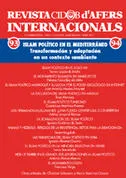Political Islam in Tunisia Electoral conflict and cooperation in the presidencial elections of 2004 and 2009

One of the key points in the future of today’s political transition in Tunisia lies in the Islamists’ willing­ness to cooperate with the rest of the political parties to promote political change, as well as their electoral performance in the next elections. The aim of this article is to help reduce uncertainty on this issue, by clarifying its antecedents. With this aim, the author adopts as the article’s area of study the strategic-relational dimensions of Tunisia’s Islamist party’s performance in elections. With this in mind, the author analyses the types of interaction that the Islamist party maintained in the presidential elections of 2004 and 2009 with the other political and social parties that were critical of the Ben Ali regime, and examines its causes. As a result of this, the study concludes that up to now, both the party’s alignment with certain secular political and social actors from the structure of opposition to the Ben Ali regime, and its policy of confrontation with certain others, has not been based on any programmatic issue, nor on any issues of sensitivity or religious conception, but rather on the struggle to head political change and to lead a new government.
Key words: Tunisia, Islamist, political Islam, elections
The full text articles of this issue are available only in Spanish language